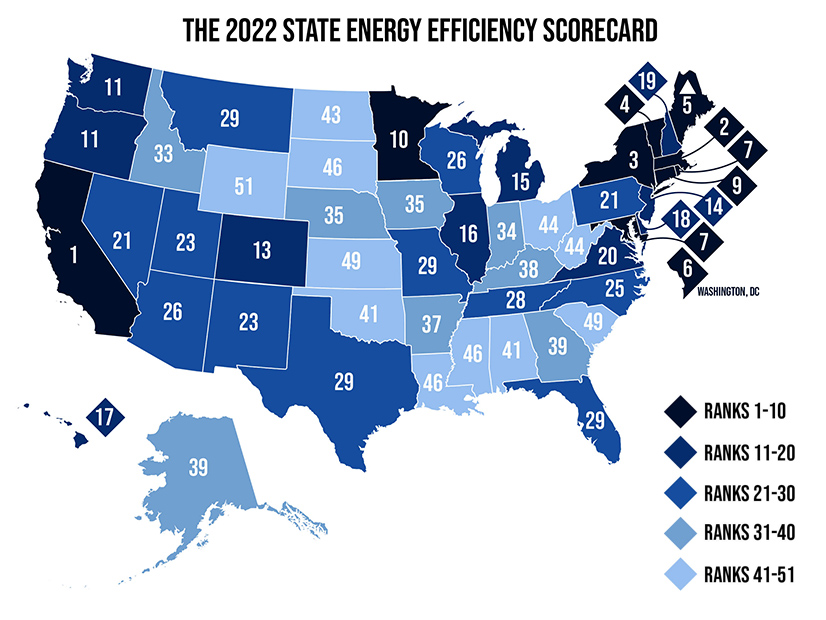California ranks highest in a nonprofit advocacy group’s annual report on states’ energy-efficiency policies and programs, while the next eight entrants on the list are all clustered in the Mid-Atlantic and New England regions.
The American Council for an Energy-Efficient Economy on Tuesday issued the 2022 edition of its State Energy Efficiency Scorecard, first compiled in 2007.
It was the second year in a row that ACEEE put California at the top of the list; the report’s authors said it has become a leader for other states with its clean energy building codes and standards for vehicle emissions and appliance efficiency. As a result, it was awarded 47 of a possible 50 points.
“California recently approved the Advanced Clean Cars II rule, which will help the state meet its carbon neutrality targets,” the report noted. “The rule, if adopted by other states, will greatly grow the zero-emission vehicle market and deliver significant clean air and climate benefits.”
This year’s scorecard gave greater weight to states’ efforts to ensure that the clean energy transition benefited all segments of society, including those marginalized in the past.
During a webinar Tuesday discussing the scorecard, California Public Utilities Commissioner Genevieve Shiroma said the state has a very aggressive environmental justice plan to ask the question “are we lifting the least among us” as it moves the energy transition forward.
California attained a near-perfect score on equity, but 34 states earned less than half the possible points, according to ACEEE’s Sagarika Subramanian, lead author of the study.
“A small but growing number of states are making progress toward [equity],” she said during the webinar. “I think leading states are really understanding the importance of all customers being included in the clean energy transition.”
Among the 50 states and D.C., Maine made the biggest jump in the annual ratings, moving up 11 spots to No. 5 on the strength of its climate leadership, particularly in the buildings sector.
Projects funded by Maine’s housing authority are now required to be all-electric and include EV charging; weatherization and heat pump incentives have been increased; and Maine’s Clean Transportation Roadmap sets out a plan to advance EV adoption.
Dan Burgess, director of the Maine Governor’s Energy Office, said Gov. Janet Mills and the Legislature have set out ambitious energy-efficiency and net-zero goals. “We’ve been hard at work across state government and with partners across Maine working on how to achieve those targets,” he said.
The scorecard reflects the great diversity of opinion and policy within the U.S. The authors note that while some states are taking extensive steps to encourage electrification, at least a dozen others forbid incentives to switch from fossil fuel heat to electric.
South Carolina took the biggest drop in the rankings, falling nine spots to tie with Kansas at 49th because of policies that discourage use of efficiency funds for fuel switching; restrictions on jurisdictions adopting a more stringent energy code than the statewide code; and not having equitable planning or processes.
Dead last on the ACEEE scorecard was Wyoming, at 51st place with 2 points.
The scorecard flags Colorado (13), Michigan (15), Nevada (21), New York (3), North Carolina (25), Oregon (11) and Washington (11, tied with Oregon) as “states to watch” because of their high ranks within their own regions and the promising model they offer their neighbors.




